M2U3单元卷二
- 格式:doc
- 大小:389.00 KB
- 文档页数:5
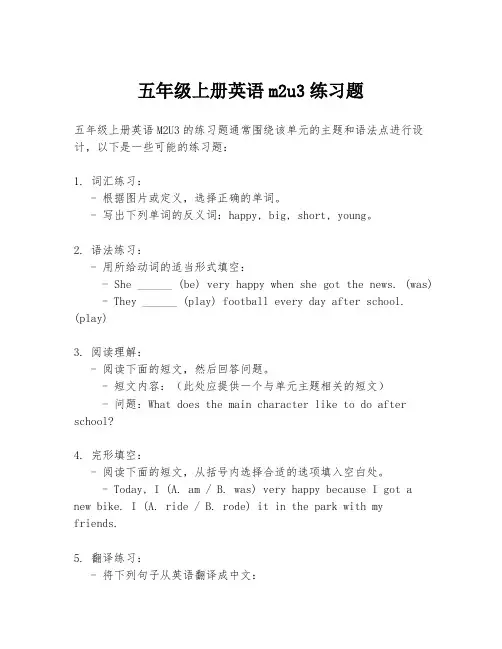
五年级上册英语m2u3练习题五年级上册英语M2U3的练习题通常围绕该单元的主题和语法点进行设计,以下是一些可能的练习题:1. 词汇练习:- 根据图片或定义,选择正确的单词。
- 写出下列单词的反义词:happy, big, short, young。
2. 语法练习:- 用所给动词的适当形式填空:- She ______ (be) very happy when she got the news. (was) - They ______ (play) football every day after school. (play)3. 阅读理解:- 阅读下面的短文,然后回答问题。
- 短文内容:(此处应提供一个与单元主题相关的短文)- 问题:What does the main character like to do after school?4. 完形填空:- 阅读下面的短文,从括号内选择合适的选项填入空白处。
- Today, I (A. am / B. was) very happy because I got a new bike. I (A. ride / B. rode) it in the park with my friends.5. 翻译练习:- 将下列句子从英语翻译成中文:- I usually go to the library after school.- My mother is cooking dinner in the kitchen.6. 写作练习:- 写一篇小短文,描述你最喜欢的一天,并解释为什么。
7. 听力练习(如果适用):- 听录音,完成以下任务:- 听一段对话,然后选择正确的答案。
- 听一个故事,回答问题。
8. 口语练习:- 与同伴一起练习对话,例如在商店购物或在餐厅点餐的场景。
9. 连词成句:- 将下列单词连成一句通顺的话:- likes, she, ice cream, very much.10. 选择题:- 下列哪个句子是正确的?A. They plays football every day.B. They play football every day.C. They played football every day.请注意,这些练习题需要根据实际教学内容和学生水平进行调整。
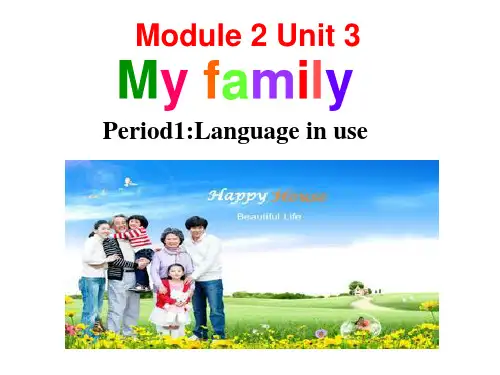
![[荐]外研版英语七年级下M2U3单元检测练习名校版含答案](https://uimg.taocdn.com/dd4f7ed267ec102de2bd89ff.webp)
外研版英语七年级下M2U3单元检测练习名校版含答案通过各种形式的练习,帮助学生巩固本单元所学重点词汇以及句型、语法,体会其在具体语境中的含义及用法,抓好基础,回归教材。
一、根据句意,用括号中所给单词的适当形式完成句子。
1.These are not______(we)CDs. They are Tom's and Tim's.2.Jack, let's go______(swim)on Saturday afternoon.3.Can the little bird______(fly)? No, it can't. It's too small.4.Look! Grandma is making______(kite)for us.5.Tom is from London and he______(speak)English.6.Can I______(play)football this afternoon?7.They can't______(open)the window.二、根据短文意思,用所给词的适当形式填空。
make, well, monitor, piano, cleanI like playing the___1___. I am Chinese so I can speak Chinese very___2___and I can speak English too. I am very tidy and I help my mum___3___our home. I want to be the cleaning___4___at school because I want to___5___our classroom beautiful.三、句子翻译。
1.你能放风筝吗?是的。
2.他们不能教我地理。
3.我能打乒乓球。
4.她能在每一场比赛中的最高的分数。
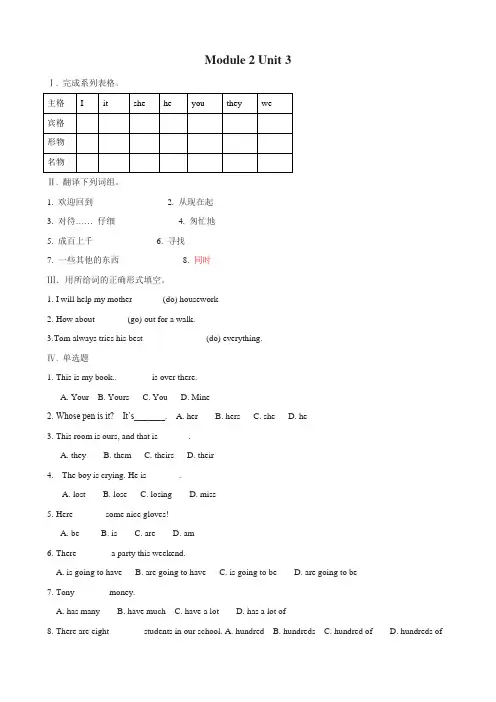
Module 2 Unit 3Ⅰ. 完成系列表格。
Ⅱ. 翻译下列词组。
1. 欢迎回到______________2. 从现在起______________3. 对待……仔细______________4. 匆忙地______________5. 成百上千______________6. 寻找______________7. 一些其他的东西______________ 8.同时______________Ⅲ.用所给词的正确形式填空。
1. I will help my mother_______(do) housework2. How about _______(go) out for a walk.3.Tom always tries his best ______________(do) everything.Ⅳ. 单选题1. This is my book.. _______ is over there.A. YourB. YoursC. YouD. Mine2. Whose pen is it? It’s_______. A. her B. hers C. she D. he3. This room is ours, and that is_______.A. theyB. themC. theirsD. their4.The boy is crying. He is _______.A. lostB. loseC. losingD. miss5. Here_______ some nice gloves!A. beB. isC. areD. am6. There _______ a party this weekend.A. is going to haveB. are going to haveC. is going to beD. are going to be7. Tony _______ money.A. has manyB. have muchC. have a lotD. has a lot of8. There are eight _______ students in our school. A. hundred B. hundreds C. hundred of D. hundreds ofKeys:Ⅰ.Ⅱ. 1. welcome back to 2. from now on 3. treat…carefully 4. in a hurry 5. thousands of 6. look for 7. something else 8. at the same timeⅢ. 1. do / to do 2. going 3. to doⅣ. 1-5 BBCAC 6-8 CDA。
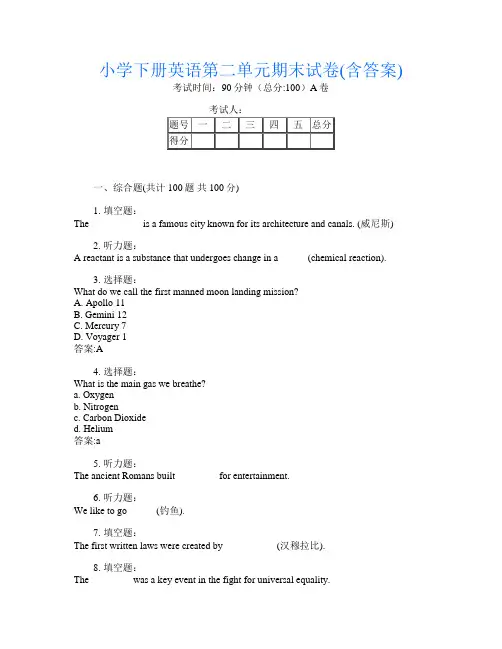
小学下册英语第二单元期末试卷(含答案)考试时间:90分钟(总分:100)A卷一、综合题(共计100题共100分)1. 填空题:The __________ is a famous city known for its architecture and canals. (威尼斯)2. 听力题:A reactant is a substance that undergoes change in a _____ (chemical reaction).3. 选择题:What do we call the first manned moon landing mission?A. Apollo 11B. Gemini 12C. Mercury 7D. Voyager 1答案:A4. 选择题:What is the main gas we breathe?a. Oxygenb. Nitrogenc. Carbon Dioxided. Helium答案:a5. 听力题:The ancient Romans built ________ for entertainment.6. 听力题:We like to go _____ (钓鱼).7. 填空题:The first written laws were created by __________ (汉穆拉比).8. 填空题:The ________ was a key event in the fight for universal equality.9. 选择题:What is the capital of India?A. MumbaiB. New DelhiC. KolkataD. Bangalore10. 选择题:What is the main ingredient in a smoothie?A. MilkB. FruitC. CerealD. Yogurt答案:B11. 听力题:She likes to _____ (dance).12. 听力题:She is wearing a nice ___. (sweater)13. 填空题:A ________ is a cute little animal.14. 听力题:Chlorine is a ______ gas used for disinfecting water.15. 填空题:My favorite animal is a ______ (小狗). It loves to play and run around the ______ (公园).16. 听力题:A solution that does not conduct electricity is called a ______ solution.17. 选择题:What is the largest organ in the human body?A. HeartB. SkinC. LiverD. Lung答案:B18. 选择题:What color is a banana when it is ripe?A. GreenB. YellowC. BrownD. Red答案:B19. 选择题:What do we call the art of storytelling through pictures?A. PhotographyB. PaintingC. IllustrationD. Animation答案:C20. 填空题:The invention of ________ has greatly advanced communication technology.21. 填空题:My teacher always encourages us to _______ (动词) and ask questions in class. It is very _______ (形容词).22. 填空题:_____ (种植) vegetables is rewarding and fun.23. 选择题:What is the name of the event where people come together to celebrate a festival?A. GatheringB. CelebrationC. PartyD. Event答案: B24. 填空题:The __________ (历史的影响力) can reshape policies and ideologies.25. 填空题:Violets are _______ flowers that bloom in spring.26. 填空题:I love _______ (参加) dance classes.27. 填空题:The owl hoots at _______ (猫头鹰在_______时叫).28. 听力题:The chemical formula for -octanoic acid is ______.29. Constitution was ratified in ______ (1788年). 填空题:The Unde30. 选择题:What do we call the study of the structure and function of cells?A. HistologyB. CytologyC. AnatomyD. Physiology31. 听力题:She _____ (enjoy/enjoys) dancing.32. 填空题:We have a ______ (丰富的) curriculum focused on arts.33. 选择题:What is the main source of energy for all living things?A. WaterB. FoodC. SunlightD. Air答案:C. Sunlight34. 听力题:The chemical formula for table salt is ______.35. 选择题:What is the name of the famous explorer who discovered America?A. Christopher ColumbusB. Ferdinand MagellanC. Marco PoloD. Vasco da Gama36. 填空题:The ______ is very fast.37. 听力题:The main component of limestone is _______ carbonate.38. 填空题:The __________ is a major river that flows through Brazil. (亚马逊河)39. 选择题:What is the capital of Kenya?A. NairobiB. MombasaC. KisumuD. Nakuru答案:A40. 填空题:A __________ (科学文化) encourages inquiry and critical thinking in education.41. 听力题:The _______ of sound can be influenced by the medium through which it travels.42. 填空题:The ______ (植物) kingdom includes trees, flowers, and bushes.43. 听力题:The chemical symbol for nitrogen is ______.44. 听力题:A __________ is a large area of wetlands.45. 选择题:What is the name of the famous ancient structure in Greece?A. ColosseumB. ParthenonC. Great WallD. Pyramids答案:B46. 填空题:The ________ (冒险旅行) leads to new discoveries.47. 填空题:The _____ (拼图) is challenging but fun.48. 填空题:The _____ (狼) howls at the moon at night. It sounds eerie. 狼在夜晚对着月亮嚎叫。
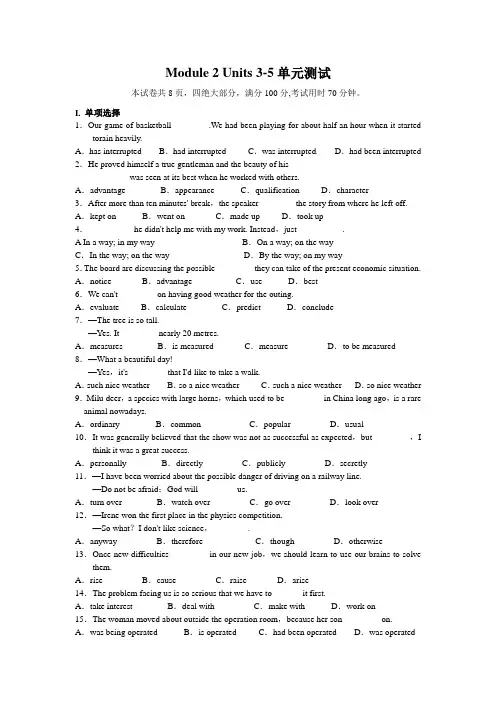
Module 2 Units 3-5单元测试本试卷共8页,四绝大部分,满分100分,考试用时70分钟。
I. 单项选择1.Our game of basketball ________.We had been playing for about half an hour when it started torain heavily.A.has interrupted B.had interrupted C.was interrupted D.had been interrupted 2.He proved himself a true gentleman and the beauty of his________ was seen at its best when he worked with others.A.advantage B.appearance C.qualification D.character3.After more than ten minutes' break,the speaker________ the story from where he left off. A.kept on B.went on C.made up D.took up4.__________ he didn't help me with my work. Instead,just __________.A In a way; in my way B.On a way; on the wayC.In the way; on the way D.By the way; on my way5.The board are discussing the possible ________ they can take of the present economic situation. A.notice B.advantage C.use D.best6.We can't ________ on having good weather for the outing.A.evaluate B.calculate C.predict D.conclude7.—The tree is so tall.—Yes. It ________ nearly 20 metres.A.measures B.is measured C.measure D.to be measured 8.—What a beautiful day!—Yes,it's ________ that I'd like to take a walk.A.such nice weather B.so a nice weather C.such a nice weather D.so nice weather 9.Milu deer,a species with large horns,which used to be ________ in China long ago,is a rare animal nowadays.A.ordinary B.common C.popular D.usual10.It was generally believed that the show was not as successful as expected,but ________,I think it was a great success.A.personally B.directly C.publicly D.secretly11.—I have been worried about the possible danger of driving on a railway line.—Do not be afraid;God will ________ us.A.turn over B.watch over C.go over D.look over 12.—Irene won the first place in the physics competition.—So what?I don't like science,________.A.anyway B.therefore C.though D.otherwise 13.Once new difficulties ________ in our new job,we should learn to use our brains to solve them.A.rise B.cause C.raise D.arise14.The problem facing us is so serious that we have to ______ it first.A.take interest B.deal with C.make with D.work on15.The woman moved about outside the operation room,because her son ________ on. A.was being operated B.is operated C.had been operated D.was operatedII 完形填空There lived in the State of Qi a man who had a very bad memory. While walking, he would forget to stop; while sleeping, he would forget to get up. His wife was very much 36 this and said to him one day, “I've37 that Master Ai is a very 38 man. He can even 39 the dying back to life. Why don't you go and 40 him for advice?”“Good idea!” the man agreed. So he 41 on horseback, bow and arrow in hand. Before he had 42 a distance of about 30 li he felt a call of nature (想解手). He got off his horse and, after sticking the arrow into the ground and tying the 43 to a tree, crouched down (蹲下) to hide himself. This done, he 44 and looked to the left and then caught sight of the 45 .“Wow!” he cried. “What a narrow escape! I wonder 46 that arrow came from. It 47 hit me.” Then, looking to the 48 , he saw the horse.“Well,well!” he said with joy. “49 I've been badly frightened, I'm now 50 with a horse.”Whipping his horse, h e took the 51 direction. Not long afterwards, he arrived 52 . Pacing up and down in front of 53 own house, he said to himself, “Whose house is this? Can this be the house of Master Ai?”54 this moment, his wife saw him. Guessing that his memory must have gone wrong again, she said dirty words to him. Very much upset, the man 55 , “I've never seen you before in my life. Why did you say something like that to me?”16. A. excited about B. angry with C. worried about D. surprised at17. A. heard B. known C. understood D. told18. A. kind B. stupid C. strange D. learned19. A. bring B. take C. get D. lead20. A. see B. tell C. ask D. look21. A. set out B. set up C. set aside D. set on22. A. gone B. covered C. done D. passed23. A. horse B. bow C. arrow D. hand24. A. pulled up B. sat down C. stood up D. set up25. A. arrow B. bow C. horse D. tree26. A. which B. when C. why D. where27. A. almost B. closely C. just D. only28. A. front B. left C. sky D. right29. A. Even B. Though C. Once D. As30. A. rewarded B. punished C. fined D. given31. A. direct B. right C. front D. wrong32. A. h ome B. house C. village D. city33. A. her B. his C. their D. Master Ai's34. A. During B. On C. At D. In35. A. complained B. smiled C. felt D. laughedIII 阅读理解AA four-year-old boy has become pen pals with Britain's Queen Elizabeth.Tom Stancombe started exchanging letters with the queen after he set free a balloon,carrying his name and address,at a school party and it landed in the grounds of Windsor Castle.The queen spotted the balloon and asked her personal assistant,Angela Kelly,to write a letter on her behalf.She wrote,“The queen was delighted to find that your balloon had traveled all the way to the gardens at Windsor Castle.”Tom,who proudly put the letter on his wall,wrote back to say that his great,great grandfather,the artist Petrus Johannes Arundzen,had been commissioned (正式委托) to copy Dutch masters' on display at Windsor Castle and Buckingham Palace.Angela at once replied that she would contact the Royal Collection to find out what had happened to the art works.She kept her word and two weeks later wrote to Tom to tell him what had happened to the etchings,explaining they now form part of the print collection in the Print Library.Angela then asked a favor of Tom,writing,“Would you be able to ask your Mummy and Daddy for me if they know anything more about your great,great grandfather.Royal Collection would love to know more about him.”Along with his parents,Tom wrote back to fill in all the gaps about Petrus Johannes Arundzen.Although Tom's parents don't think there will be any more letters exchanged between the pair,they were touched that she had taken time to contact them.Tom's father said,“I don't expect we'll get another one,but I think it's incredible they bothered replying at all.”1.Windsor Castle is________.A.a playing ground B.the queen's home C.a post office D.a rose garden 2.The underlined word “etchings” in Paragraph 5 means ________.A.photos B.cartoons C.postcards D.paintings3.Tom's parents ________.A.feel very much shocked about the letters and refuse to answer themB.try to deal with the friendship naturally but refuse to do anything about itC.don't take the matter very seriouslyD.don't think this friendship will last long but somehow feel good4.Which would be the best title for the text?A.A Boy's Good Luck B.Tom's Special BalloonC.A Story at Windsor Castle D.Four-year-old Boy Becomes the Queen's Pen PalBThe Internet brings us many advantages.With the Internet, people can send and receive e-mails. On the Internet, people can skim over news. Using the Telnet, the user anywhere on the Internet can log into any other machine on which he has an account. It is possible to use the FTP program to copy files from one machine on the Internet to another.But the Internet also brings us troubles.Internet use seems to cause a fall in psychological (心理的) health, according to research at Carnegie Mellon University. Even people who spent just a few hours a week on the Internet experienced more depression and loneliness than those who logged on less often, the two-year study showed. And it wasn't that people who were already feeling bad spent more time on the Internet, but that using the Net actually seemed to cause the bad feelings.Researchers are puzzling over the results, which were completely opposite to what they had expected. They expected that the Net would prove socially healthier than television, since the Netallows users to choose their information and to communicate with others.The fact that Internet use reduces time used for family and friends may be the reason for the drop in health, researchers said. Faceless, bodiless “virtual” (虚拟的) communication may be less psychologically satisfying than actual conversations, and the relationships formed through it may not be so deep. Another possibility is that exposure to the wider world through the Net makes users less satisfied with their lives.“But it's important to remember this is not about the technology; it's about how it is used,” said one of the researchers. “It really points to the need for considering social factors (因素) when you design new inventions.”5. The writer mainly wants to tell us that _________.A. the Internet can bring people many advantagesB. the Internet use may cause psychological problemsC. the Internet users are not satisfied with their livesD. we shouldn't use the Internet6. Why are the researchers puzzling over the results?A. Because the results were completely different from what they had thought.B. Because the Net proved socially healthier than television.C. Because the Internet users were all healthier.D. Because the Internet users experienced less depression and loneliness.7. What may be the reasons why the Internet use causes a fall in psychological health?A. Internet use reduces time used for family and friends.B. Virtual communication is less psychologically satisfying than actual conversations.C. Exposure to the wider world through the Net makes users less satisfied with their lives.D. All the above.8. According to the passage, which of the following is TRUE?A. Users anywhere on the Internet can log into any other machine.B. The two-year study showed that using the Net seemed to cause the bad feelings.C. People who are already feeling bad spend much more time on the Internet.D. Relationships formed through the Internet are usually deep.9. What does the underlined part in the last paragraph mean?A. What matters is not the technology but how it is used.B. This passage is not about the technology but about how it is used.C. We should remember to learn about the technology.D. We should remember to learn how to use computers.CHe knew his colors and shapes, he learned more than 100 English words, and with his own brand of one-liners he established (确立) himself in TV shows, scientific reports, and news articles as perhaps the world's most famous talking bird.But last week, Alex, an African parrot, died, obviously of natural causes, said Dr Irene Pepperberg, an expert at Brandeis University and Harvard who studied and worked with the parrot for most of its life and published reports of his progress in scientific journals. The parrot was 31.Scientists have long debated whether any other species can develop the ability to learn human language. Alex's language ability was, in some ways, more surprising than the efforts of thoseanimals that have been taught, like Koko, the gorilla (猩猩) trained by Penny Patterson at the Gorilla Foundation in Woodside, or Washoe, another gorilla studied by R. Allen and Beatrice Gardner at the University of Nevada in the 1960s and 1970s.When Dr Pepperberg, who was then a doctoral student in chemistry at Harvard, found Alex was good at remembering words in a pet store in 1977 and bought it, scientists had little expectation that birds could learn to communicate with humans. Most of the research had been done on pigeons, and was not promising.But by using novel methods of teaching, Dr Pepperberg taught Alex to learn about 150 words, which he could put into categories. He could count small numbers and tell colors and shapes. “The work changed the way we think of bird brains,”said Diana Reiss, a psychologist at Hunter College who works with dolphins and elephants. “We used to look down upon those birds, but now we look at those brains — at least Alex's — with some awe.”10. Alex is very famous because ______.A. it died of a strange diseaseB. it lived longer than any other parrotC. it hosted many famous TV showsD. it has a special talent in learning human language11. What was the direct reason why Dr Pepperberg bought Alex?A. He found it was good at remembering words.B. He liked its colors and shapes.C. He wanted to do research on birds.D. Diana Reiss asked him to do that.12. What does the underlined word “novel” mean in the last paragraph?A. Special.B. New.C. Great.D. Unique.13. According to the last paragraph, we can learn that ___.A. people used to think dolphins were the cleverestB. Alex's ability of learning human language has changed some researchers' ideas about birdsC. elephants are better at learning human languageD. birds' great ability in learning human language has already been noticed before14. What would be the best title for this passage?A. Who are cleverer, birds or gorillas?B. A famous talking bird died.C. Have you ever talked with a bird?D. The keeper of a famous bird.DA home computer not only helps children master the old ways of learning, but also opens up possibilities that simply aren't available in traditional education. Some software, for example, allows kids to make decisions and see the results in different situations. The World Wide Web encourages young minds to move easily from link to link, topic to topic. The best software draws children into learning by making them curious — what if I click on this picture, drag this over here, visit that website?Knowing how to use a computer also encourages a child's confidence. Kids figure out quickly that computers are powerful, and mastering the machine makes them feel grown-up. Inturn, feeling confident on a computer often translates to academic (学术的) confidence. Researchers have found that attitudes toward writing, for example, improve when students write on a computer.Perhaps most importantly, computers can enrich family life. Forget the idea that computer kids are separated. Children like to use the computer with adults and other kids, asking questions and comparing results. “The Internet is a unique opportunity to bring resources home,” notes Susan Haugland, PhD, Cape Girardeau, Mo., author of Computer and Young Children:A World of Discovery.Although the benefits of computers are real, they have disadvantages, too. Kids can lose their way, wasting hours on mindless software or violent games. Just as parents have always helped children make good choices about everything from friends to food, books to TV, now we must make sure they get the best out of computers.15. The passage is mainly talking about ________________.A. the disadvantages of children's using computersB. the advantages of children's using computersC. the development of computersD. the fact using computers makes children lose their way16. Which of the following is NOT an advantage of a home computer?A. It provides new ways of learning.B. It encourages children's confidence.C. It can enrich family life.D. Kids can play violent games on it.17. What effects do computers have on family life?A. They reduce the connection between family members.B. They destroy the relationship between parents and kids.C. They provide more opportunities of communication.D. They make all the family members study together.18. According to the last paragraph, we can learn that we should __________________.A. let children use computers freelyB. forbid children to use computers in their spare timeC. permit children to use any software they likeD. help children make good use of the computersEMy Grandpa has arthritis (关节炎), and it's getting harder and harder for him to do certain things.When I was a little girl, my grandpa would play this game with me. He would tell me to hold out my hand, and in it he would place a shiny silver quarter. Wow, I thought I had the world sitting in my hand. He would tell me that if I could keep it away from him, I could have it. I knew that I couldn't keep it away from him, but I would always try. Then he would tell me that if I could get it away from him, then he would give it back to me.I remember feeling so small compared with him, and I also remember feeling embarrassed because I knew there was no way that I could get that quarter from him. But I tried. I would climb down from my chair, with defeat weighing heavily on my back.“Bug?” he'd say.“Ya Grandpa?” I'd reply, trying to sound as sad as possible.“Here.”There in his outstretched hand would be my quarter. It always ended the same. He would always hand it over. I always knew that I would have to wait until the game was over to get my quarter, because he had so much pride and self-worth that he couldn't lose to a 4-year-old girl. After I grew up, when we played the game again, I never wanted to defeat him. I just wanted to be with him. I loved to hear him tell me what I did wrong, and how to get it right the next time, and I loved the pride in his voice.19. In which order did the following things happen during the game?a. Grandpa placed a shining silver quarter in my hand.b. Grandpa told me if I could get it away from him, I could keep it.c. He gave the quarter over to me and I got it.d. Grandpa told me if I could keep it away from him, I could keep it.A. a d b cB. a b c dC. a b d cD. a c d b20. This passage is mainly about _______.A. the writer's grandpa's serious arthritisB. the writer's deep feeling for her GrandpaC. games between the grandpa and the writerD. grandpa's success in all games21. Why didn't the writer want to defeat her grandpa?A. She couldn't defeat her grandpa.B. She liked to see his pride.C. She didn't want to shame her grandpa.D. She was afraid that Grandpa wouldn't play with her.IV写作第一节短文改错假定英语课上老师要求同桌之间交换修改作文,请你修改你同桌写的以下作文。
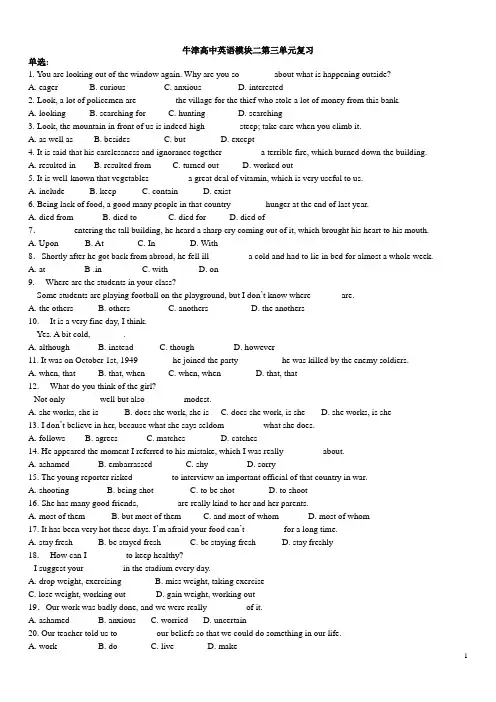
牛津高中英语模块二第三单元复习单选:1. You are looking out of the window again. Why are you so _______ about what is happening outside?A. eagerB. curiousC. anxiousD. interested2. Look, a lot of policemen are ________ the village for the thief who stole a lot of money from this bank.A. lookingB. searching forC. huntingD. searching3. Look, the mountain in front of us is indeed high _______ steep; take care when you climb it.A. as well asB. besidesC. butD. except4. It is said that his carelessness and ignorance together ________ a terrible fire, which burned down the building.A. resulted inB. resulted fromC. turned outD. worked out5. It is well-known that vegetables ________ a great deal of vitamin, which is very useful to us.A. includeB. keepC. containD. exist6. Being lack of food, a good many people in that country _______ hunger at the end of last year.A. died fromB. died toC. died forD. died of7._______ entering the tall building, he heard a sharp cry coming out of it, which brought his heart to his mouth.A. UponB. AtC. InD. With8.Shortly after he got back from abroad, he fell ill ________ a cold and had to lie in bed for almost a whole week.A. at B .in C. with D. on9. ---Where are the students in your class?---Some students are playing football on the playground, but I don‟t know where ______ are.A. the othersB. othersC. anothersD. the anothers10. ---It is a very fine day, I think.---Yes. A bit cold, _______.A. althoughB. insteadC. thoughD. however11. It was on October 1st, 1949 _______ he joined the party _________ he was killed by the enemy soldiers.A. when, thatB. that, whenC. when, whenD. that, that12. ---What do you think of the girl?--Not only _______ well but also ________ modest.A. she works, she isB. does she work, she isC. does she work, is sheD. she works, is she13. I don‟t believe in her, because what she says seldom ________ what she does.A. followsB. agreesC. matchesD. catches14. He appeared the moment I referred to his mistake, which I was really ________ about.A. ashamedB. embarrassedC. shyD. sorry15. The young reporter risked ________ to interview an important official of that country in war.A. shootingB. being shotC. to be shotD. to shoot16. She has many good friends, ________ are really kind to her and her parents.A. most of themB. but most of themC. and most of whomD. most of whom17. It has been very hot these days. I‟m afraid your food can‟t ________ for a long time.A. stay freshB. be stayed freshC. be staying freshD. stay freshly18. ---How can I ________ to keep healthy?--I suggest your ________ in the stadium every day.A. drop weight, exercisingB. miss weight, taking exerciseC. lose weight, working outD. gain weight, working out19.Our work was badly done, and we were really ________ of it.A. ashamedB. anxiousC. worriedD. uncertain20. Our teacher told us to ________ our beliefs so that we could do something in our life.A. workB. doC. liveD. make21. Hasn‟t the $10 you lent me ________ ?A. been paid backB. paid forC. paid offD. been paid for22. We must ________ our eyes from dust and the sun in the open air.A. shutB. protectC. keepD. prevent23.________helping them we are helping to save ourselves. A. With B. For C. Of D. By24. His carelessness ________ the forest fire should have been avoided.A. resulting inB. caused byC. being broughtD. led to25.________ with flying, walking is much slower. A. Comparing B. Compared C. To compare pare26. Write a story ________ the stories you and your classmates have acted out.A. is based onB. basing onC. which based onD. based on27. The man _________ at the meeting is a very famous writer.A. referred toB. who refers toC. referring toD. refers to28. If _________ more time, I could have finished the task much better.A. being givenB. givenC. gives meD. giving29. The Song Dynasty __________ three great inventions to world civilization.A. contributedB. discoveredC. inventedD. devoted30. It was the best result that they‟ve ________ had. A. never B. once C. even D. ever31. She wore beautiful ________ round her neck. A. jewels B. jewelries C. jewel D. necklace32. Every time _________ I saw him, he was working hard.A. thatB. in whichC. /D. for which33. The teacher asked a second question _________ I could answer the first one.A. beforeB. afterC. whenD. as34. Nice _________ considerate, our new teacher soon gained our respect.A. as good asB. as far asC. as long asD. as well as35. The paper will become useless _________ into pieces.A. after tearingB. when being tornC. after tornD. when torn36. Lying in bed, we listened to the heavy rain ______ the window.A. hittingB. knockingC. beatingD. striking37. The students _______ busily when I went to get a book I _______ in the office.A. had written; leftB. were writing; have leftC. had written; had leftD. were writing; had left38.—Oh, it‟s you. I ________ you.--It‟s not surprising you didn‟t. I‟ve just had my hair dyed red.A. didn‟t recognizeB. hadn‟t recognizedC. haven‟t recognizedD. don‟t recognize39. The police found that the house _______ and a lot of things _________.A. has been broken into; stolenB. had broken intoC. has broken into; has stolenD. had been broken into; stolen40. They asked me to have a drink with them. I said it was nine years since I _______ a good drink.A. enjoyedB. was enjoyingC. had enjoyed.D. had been enjoying41. Tom was disappointed that most of the guests _____when he _______ at the party.A. left; had arrivedB. had left; had arrivedC. left; arrivedD. had left; arrived42. By the time they arrived, I _______ everything ready. A. got B. have got C. had got D. were getting43. By 1980, I _____ him for ten years; I met him for the first time in 1970.A. had knownB. have knownC. knowD. knew44. I.______ that we would be able to leave tomorrow, but it‟s beginning to look difficult.A. hopeB. had hopedC. would hopeD. was hoping45. If Bernard _________ faster, everything would have been all right.A. walkedB. have walkedC. were walkingD. had walked46. at the airport,he telephoned his wife and told her what he would do when he got home.A. Once arrivedB. As soon as he reachedC. When he gotD. Upon arriving47. What you said just now has the matter we are discussing. Let‟s come to the point.A. something to do aboutB. nothing to do aboutC. something to do withD. nothing to do with48. By the time Einstein was 14 years old, he_______ himself advanced mathematics.A. has taughtB. taughtC. had taughtD. was teaching49. We all Yang Liwei as an example of a man who managed to live his dream .A. look forward toB. look backC. look up toD. look over50. Five people won the “China‟s Green Figure” award, a title to ordinary people for their contribution to environmental protection. A. being given B. is given C. given D. was given51. They kept trying and their efforts finally .A. make itB. paid offC. are made itD. are paid off52. -Did you return Fred‟s call?-I didn‟t need to I‟ll see him tomorrow.A. thoughB. unlessC. whenD. because53. Online paper-checking requires that more attention .A. be paid to spellingB. to be paid to spellingC. should pay to spellingD. and spelling be paid to翻译:1. 霍华德﹒卡特是有史以来世界上最出名的探险家之一。
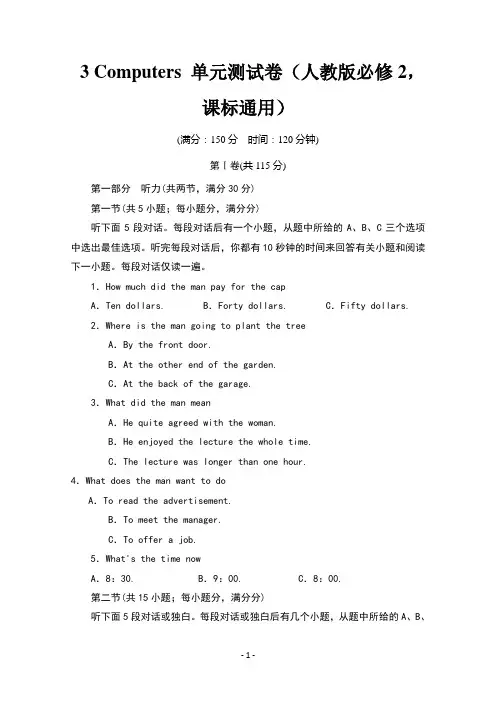
3 Computers 单元测试卷(人教版必修2,课标通用)(满分:150分时间:120分钟)第Ⅰ卷(共115分)第一部分听力(共两节,满分30分)第一节(共5小题;每小题分,满分分)听下面5段对话。
每段对话后有一个小题,从题中所给的A、B、C三个选项中选出最佳选项。
听完每段对话后,你都有10秒钟的时间来回答有关小题和阅读下一小题。
每段对话仅读一遍。
1.How much did the man pay for the capA.Ten dollars. B.Forty dollars. C.Fifty dollars.2.Where is the man going to plant the treeA.By the front door.B.At the other end of the garden.C.At the back of the garage.3.What did the man meanA.He quite agreed with the woman.B.He enjoyed the lecture the whole time.C.The lecture was longer than one hour.4.What does the man want to doA.To read the advertisement.B.To meet the manager.C.To offer a job.5.What's the time nowA.8:30. B.9:00. C.8:00.第二节(共15小题;每小题分,满分分)听下面5段对话或独白。
每段对话或独白后有几个小题,从题中所给的A、B、C三个选项中选出最佳选项。
听每段对话或独白前,你将有时间阅读各个小题,每小题5秒钟;听完后,每小题将给出5秒钟的作答时间。
每段对话或独白读两遍。
听第6段材料,回答第6至7题。
6.Why does the woman call the manA.To tell him the time and the place of a meeting.B.To tell him how to get to Birmingham.C.To tell him to visit Don White.7.Which train is the woman takingA.The 10:17. B.The 10:45. C.The 11:15.听第7段材料,回答第8至10题。
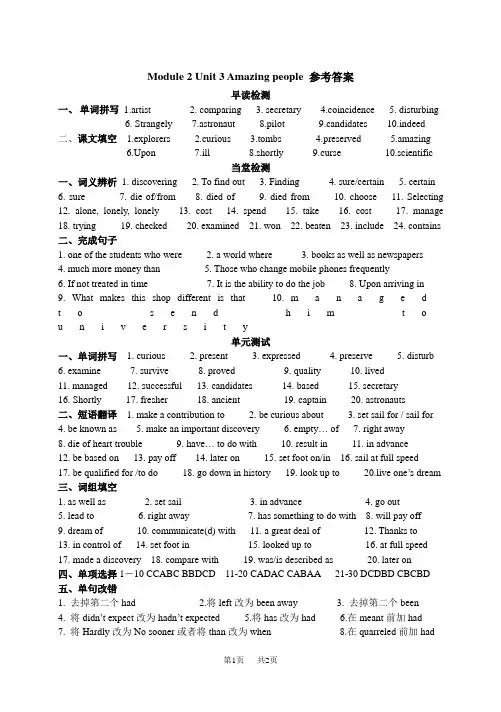
Module 2 Unit 3 Amazing people 参考答案早读检测一、单词拼写1.artist 2. comparing 3. secretary 4.coincidence 5. disturbing6. Strangely7.astronaut8.pilot9.candidates 10.indeed二、课文填空 1.explorers 2.curious 3.tombs 4.preserved 5.amazing6.Upon7.ill8.shortly9.curse 10.scientific当堂检测一、词义辨析1. discovering 2. To find out 3. Finding 4. sure/certain 5. certain6. sure7. die of/from8. died of9. died from 10. choose 11. Selecting 12. alone, lonely, lonely 13. cost 14. spend 15. take 16. cost 17. manage18. trying 19. checked 20. examined 21. won 22. beaten 23. include 24. contains二、完成句子1. one of the students who were2. a world where3. books as well as newspapers4. much more money than5. Those who change mobile phones frequently6. If not treated in time7. It is the ability to do the job8. Upon arriving in9. What makes this shop different is that 10. m a n a g e dt o s e n d h i m t ou n i v e r s i t y单元测试一、单词拼写 1. curious 2. present 3. expressed 4. preserve 5. disturb6. examine7. survive8. proved9. quality 10. lived11. managed 12. successful 13. candidates 14. based 15. secretary16. Shortly 17. fresher 18. ancient 19. captain 20. astronauts二、短语翻译 1. make a contribution to 2. be curious about 3. set sail for / sail for4. be known as5. make an important discovery6. empty… of7. right away8. die of heart trouble 9. have… to do with 10. result in 11. in advance12. be based on 13. pay off 14. later on 15. set foot on/in 16. sail at full speed17. be qualified for /to do 18. go down in history 19. look up to 20.live one’s dream三、词组填空1. as well as2. set sail3. in advance4. go out5. lead to6. right away7. has something to do with8. will pay off9. dream of 10. communicate(d) with 11. a great deal of 12. Thanks to13. in control of 14. set foot in 15. looked up to 16. at full speed17. made a discovery 18. compare with 19. was/is described as 20. later on四、单项选择1-10 CCABC BBDCD 11-20 CADAC CABAA 21-30 DCDBD CBCBD五、单句改错1. 去掉第二个had2.将left改为been away3. 去掉第二个been4. 将didn’t expect改为hadn’t expected5.将has改为had6.在meant前加had7. 将Hardly改为No sooner或者将than改为when 8.在quarreled前加had9. haven’t改为hadn’t 10. hasn’t改为hadn’t。
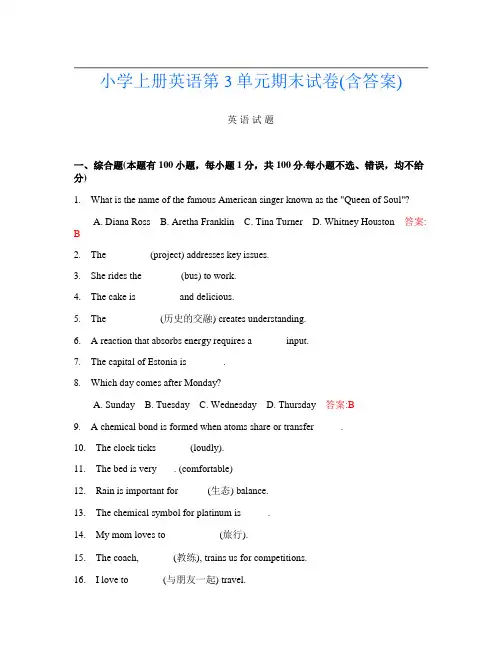
小学上册英语第3单元期末试卷(含答案)英语试题一、综合题(本题有100小题,每小题1分,共100分.每小题不选、错误,均不给分)1.What is the name of the famous American singer known as the "Queen of Soul"?A. Diana RossB. Aretha FranklinC. Tina TurnerD. Whitney Houston答案: B2.The ________ (project) addresses key issues.3.She rides the _______ (bus) to work.4.The cake is ________ and delicious.5.The __________ (历史的交融) creates understanding.6. A reaction that absorbs energy requires a ______ input.7.The capital of Estonia is _______.8.Which day comes after Monday?A. SundayB. TuesdayC. WednesdayD. Thursday答案:B9. A chemical bond is formed when atoms share or transfer _____.10.The clock ticks ______ (loudly).11.The bed is very ___. (comfortable)12.Rain is important for _____ (生态) balance.13.The chemical symbol for platinum is _____.14.My mom loves to __________ (旅行).15.The coach, ______ (教练), trains us for competitions.16.I love to ______ (与朋友一起) travel.17.What do you call the study of the mind?A. PsychologyB. SociologyC. PhilosophyD. Anthropology答案: A18.The ______ helps us learn about literature.19.What animal is famous for its black and white stripes?A. LionB. ZebraC. PandaD. Skunk答案:b20.I love _______ (写信) to my pen pal.21.What is the main ingredient in a Caesar salad?A. LettuceB. SpinachC. KaleD. Cabbage答案:A22.My sister has a fluffy _______ (我妹妹有一只毛茸茸的_______).23.The ______ reads the news every morning.24.The architect, ______ (建筑师), designs buildings.25.为下列句子选择正确的答语。
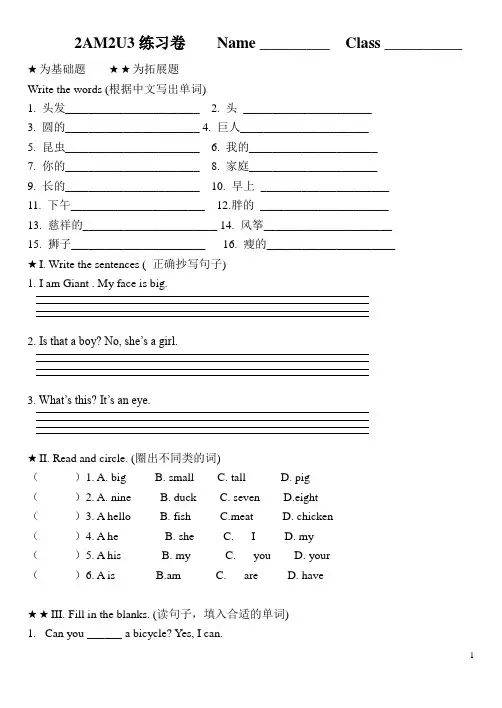
2AM2U3练习卷Name _________ Class __________ ★为基础题★★为拓展题Write the words (根据中文写出单词)1. 头发_______________________2. 头______________________3. 圆的_______________________4. 巨人______________________5. 昆虫_______________________6. 我的______________________7. 你的_______________________ 8. 家庭______________________9. 长的_______________________ 10. 早上______________________11. 下午_______________________ 12.胖的______________________13. 慈祥的_______________________ 14. 风筝______________________15. 狮子_______________________ 16. 瘦的______________________★I. Write the sentences ( 正确抄写句子)1. I am Giant . My face is big.2. Is that a boy? No, she’s a girl.3. What’s this? It’s an eye.★II. Read and circle. (圈出不同类的词)()1. A. big B. small C. tall D. pig()2. A. nine B. duck C. seven D.eight()3. A hello B. fish C.meat D. chicken()4. A he B. she C. I D. my()5. A his B. my C. you D. your()6. A is B.am C. are D. have★★III. Fill in the blanks. (读句子,填入合适的单词)1.Can you ______ a bicycle? Yes, I can.2.Do you like __________? Yes. I like apples.3.She can _______ the rope.4.He’s got _______ egg.5.How ______ you? I _____ fine.6.Is Kitty _________ ? No, she’s tall.7.How many cakes? _________ cake.8.Is this your pencil? Yes, it’s ________ pencil.★IV. Choose the best answer. (选择最合适的答案)1.Danny, can you sing? ___________.A. Yes, I can.B. Yes, he canC. Yes, he is2.I’m Giant. I’m_________A. bigB. smallC. short3. My hands ______ big.A. isB. areC. am4. You are Alice. _______ nose is small .A. YouB. MyC. Your5. ________________________? It’s or ange.A. What’s this?B. What colour is it?C. How is it?6. Peter can _________ like a rabbit .A. runB. drawC. ride7. My hair _______ short. My ears ______ small.A. are…areB. is … isC. is … are8. ______ am Miss Fang. _______ head is small.A. My … My .B. You… Your C . I … My★★V. Rewrite the sentences (模仿例句,两句并一句)例:This is my head. It’s small. → My head is small.1. This is my hair. It’s long. ______ ha ir ______ long.2. This is my face. It’s round. My _________________________.3. This is my nose . It’s small. ____________________________4. This is your head It’s big. _____________________________★VI. Read and choose (选择正确的单词填空,每词限用一次)Carrots fly ride skip dog salad1.My father can ______ a bicycle.2.What do the rabbit like? It likes ___________.3.Can you _____ a rope? Yes, I can.4.It is small. It can run. It’s my friend. It’s a __________.5.This is a bird. It can _________.★★VII. Reading (阅读,并完成练习,划出依据)ATom is a boy. He is in Grade Two, Class one (二年级一班). He has short hair. He has two big eyes. He has a red mouth. He can swim. He can write in English. We like him.1.Tom is a ___________.2.Tom is in Grade __________, Class ___________ .3.Tom’s hair is ___________.4.Tom’s eyes are ____________.5.Tom can _________ and ___________.B. Pikachu and MickeyI am Pikachu. I am yellow. My mouth is big.My ears are yellow. My eyes are big and black.I am small and naughty. (调皮的)You are Mickey. You are cute. Your ears are big and black.Your eyes are big too. Your hands are big. You can play football.You are super .Read and choose (选择方框内的单词完成句子,把编号填在横线上)1.My mother has ________ hair.2.Look, your face is ________.3.My nose is __________4.Jack is a ______ boy. Look! His mother is angry. (生气的)5.The cat is _________. I like this cat very much.★★VIII.Writing (用几句话来介绍自己的外貌特征)Look! This is me.I am __________.I am ______ and ________.My head is ____________.My hair is _____________ .My face _____________ .My eyes _______________ .My ears _____________________ .My _________________________________________________________________________________________。
Unit 3 M2一单词1. 保存,保护v__________ n__________2. 打扰v__________ n__________3. 鼓舞,启迪v__________ n __________ 4 泄气v__________ n__________ 5. 渴望,欲望v__________ 6 申请应用v_________ n__________ 7. 探索探险v__________ n__________ 8 财富,运气n__________ adj____________ 9. 发现v__________ n__________ 10. 入口n_________ v___________ 11. 内容目录n_________ adj__________ 12. 死亡n_______ v______ adj______ 13. 巧合碰巧n__________adj__________ 14. 连接v________n______adj______ 15. 惩罚n_________ v___________ 16. 劳动,劳工v/n___________17. 信号v/n _________ 18. 符号,手势,迹象n____________ 19. 警告v__________ n__________ 20. 要求,需求v__________ n____________ 21. 性别n_______ 22. 国家_________ 23 国籍___________ 24. 组织v__________ n____________ 25. 奉献,专心v_________ n__________ 26. 航海n___________ 27. 陪伴v_______ n _______ 同伴n_______ 28. 地位n___________ 29. 质量________ 数量_____________ 30. 好奇的___________ 31. 科学n_________ adj___________ 32. 广泛的___________ 33. 男性________ 女性___________34. 各种各样的__________ 35. 本土的本国的______________36. 友好的外向的__________ 37. 乐观_________________二根据首字母填空1. If ___________ (呼吸)in, these viruses can result in illness or even death.2. Practise your spoken English and then you can _________ (表达) yourself freely.3. He was punished for __________ (打扰)others when they were working.4. The policeman showed great _________(勇敢)in face of danger.5. This article is not well ___________(组织).6. It was a ___________(巧合)that he was born on his mother's birthday.7. The ancient buildings in this area are well ____________(保护).8. We need food and water for _____________ (生存).9. She is one of the best ____________ (秘书) I have ever seen.10. The doctor __________(检查)the boy and found there was nothing the matter with him.11. It is c____ that , while swimming comes to most animals, men have to learn to swim.12. The c________ of the two compositions is more or less the same. Someone must have cheated.13. These goods are of good q________ and sell well.14. Nature i_______ him to write many good poems.15. I don't think it is explained in s________ way.16. It is said he will make another e_________ to Antarctic next month17. The article is not well organised and will not be p_____________..18. The boy made up an excuse to escape p__________.19. To my d_______________, our team was beaten by 1 score.20. It was your fault to ignore his w________ us of the dangers三短语result in as well as, right away, shortly after,have something to do with, live on, look up to sb, live one’s dreamgo out be curious about come across at the age ofby the 1920s set foot on fall ill with fever die ofmanage to do thanks to have fun search forbe in connection with in control of be fit for carry outbe inspired by have a strong desire to apply tothree out of 14 be optimistic about go down in history set sail, pay off, breathe in四.填空1. 很多年得努力后,她终于实现了她的梦想After many year s’ efforts, she finally ________ __________ ___________.2.他酒后驾车造成了这起事故,造成了12人死亡His drunk driving ___________ _____ the accident, causing the death of 12 people.3. 应该劝年轻人离开毒品。
Module 2 What can you do? Unit 3 Language in use配套练习I.根据要求改写下列句子。
1. I can play basketball.否定句:____________________________________一般疑问句: _______________________________肯定回答: __________________________________否定回答: __________________________________2. David can speak English well.否定句:____________________________________一般疑问句:_______________________________肯定回答: _________________________________否定回答: __________________________________II.根据要求改写下列句子。
1. They can sing the song. (改为一般疑问句)__________________ the song?2. She can play the violin. (改为否定句)She __________________ the violin.3.Bill and Jill can play tennis. (划线部分提问)_________ Bill and Jill _________?4.My cousin wants to join the English club.(划线部分提问)___________________ your cousin want to join?5.She does well in running. (同义句)She ___________________ running.6.Lisa helps me with my English. (同义句)Lisa helps me _________ English.III.选择题(把答案写在题号前的括号内)。
Module 2 Unit 3 巩固练习一、完型填空Mike always loves ships. When he was older, he said, "I' m going to be a soldier. " But his eyes were not very 1 , and he did not get in. Then he said, "I' m going to 2 a small boat and I' m going around the world. " But boats were very expensive, and Mike did not have enough 3 Last summer Mike found a swimming 4 near his house. The lessons did not cost very 5 , and Mike began going to the school at every end of the week and having 6 . Now he is a good swimmer. Last week a little boy said to him, " You' re a very good swimmer. How do 7 learn to swim so well?""I'm not good at all," Mike said and he smiled." 8 in the water, I say to myself, thereare 9 fishes behind me! Then I' m very afraid, and I 10 quickly. "1. A. big B beautiful C. good D strong2.A. buy B make C borrow D. draw3.A. food B. work C time D. money4.A. park B. school C. farm D. factory5.A. much B. little C. many D any6.A. meals B. lessons C. talks D. games7.A. I B they C. we D you8.A. If B When C. Though D Where9.A. interesting B. nice C. dangerous D different10.A. run B. jump C. swim D fly二、阅读理解。
Module 2 Unit 3班级姓名学号Part 2 Listening(听力部分)30%Ⅰ. Listen and choose(听一听,选出听到的内容,将字母代号写在前面的括号内):5%( ) 1. A. /mætʃ/ B. /mæθs/ C. /mɑ:tʃ/( ) 2. A. /t aim/ B. /ti:m/ C. /tim/( ) 3. A. Chinese B. China C. trainer( ) 4. A. short break B. lunch break C. no break ( ) 5. A. favourite subject B. favourite sport C. favourite film Ⅱ. Listen and choose(听一听,选出听到的句子,将字母代号写在前面的括号内):4%( ) 1. A. In the morning, I have four classes.B. In the afternoon, I have four classes.C. In the morning, I have five classes.( ) 2. A. It’s time for English class.B. It’s time for Chinese class.C. It’s time for art class.( ) 3. A. PE and Music are my favourite subjects.B. PE and Chinese are my favourite subjects.C. PE and English are my favourite subjects.( ) 4. A. From 10:45 to 11:20, there is an English class.B. From 11:15 to 11:50, there is a Music class.C. From 10:45 to 11:20, there is an art class.Ⅲ. Listen and choose(听问句,选答句;听答句,选问句,将字母代号写在前面的括号内):4%( ) 1. A. I have three classes. B. I had three classes.C. Yes, I had three classes.( ) 2. A. I like Chinese best. B. I don’t like Maths.C. There is an English class.( ) 3. A. When do you have a lunch break?B. Do you have a lunch break from 11:30 to 12:50?C. There is a short break.( ) 4. A. Where do you have your art class?B. When do you have an art class?C. Why do you like art class?Ⅳ. Listen and number(根据听到的顺序,用“1---5”给下列句子编号):5% ( ) So he just draws some lines and dots on the paper. But Danny thinks that is rain. ( ) At last, Peter’s picture is very beautiful. He is happy.( ) Peter and Danny are having an art class.( ) Next Peter draws a house on the paper. And then Danny says, ‘It needs colour.’( ) Peter doesn’t like art class because he can’t draw.Ⅴ. Listen and choose(听小对话和问题,选择最佳答案,将字母代号写在前面的括号内):4%( ) 1. A. PE. B. Art.C. PE and art.( ) 2. A. One. B. TwoC. Six.( ) 3. A. At 7:30. B. At 8:30.C. At 9:30.( ) 4. A. In the art room. B. Some crayons and paper.C. Art class.Ⅵ. Listen and write(听一听,填入所缺单词完成短文,每线一词):4% This is my ____________ for today. I have seven classes. In the morning, I have four classes. They are English, Chinese, Maths and PE. I like Chinese and Maths. There is a short break __________ each class. From 11:30 to 13:00, I have a _________ break. In the afternoon, I have Art and Music. Music is my favourite ___________, because I like singing.Ⅶ. Listen and judge(听短文,判断正误,用T或F表示):4%( ) 1. Miss Luo teaches us English.( ) 2. Miss Luo can only sing English songs very well.( ) 3. Miss Luo often goes to see films with her daughter.( ) 4. Miss Luo can make bread for us. It’s yummy.Part 2 Reading and writing(笔试部分)70%Ⅰ. Copy the sentences(正确抄写下列句子,注意大小写和标点符号):5% it and pe are my favourite subjects what about you______(1) (2) (3) (4) (6)1. We are having an ____________ class.2. --- What subject do you like? --- I like_________.3. --- Whose _________ is this? --- It’s mine. It’s for Monday.4. It’s 9:00. It’s time for _____________ class.5. In IT class, we can learn a lot about the _____________.6. There is a __________ class in the morning today.Ⅲ. Read and choose(语音判断,将不含有所给音标的单词的编号写在前面的括号内):4%( ) 1. /j/ A. jacket B. yellow C. year( ) 2. /h/ A. hotel B. whose C. wait( ) 3. /w/ A. hair B. where C. windy( ) 4. /b/ A. climb B. about C. labⅣ. Choose the best answer(用us, we, ours, my, mine填空,每词限用一次):5%1. Mr Li’s bicycle is old. But ___________ bicycle is new.2. Their kites are blue. ___________are yellow.3. Miss Li teaches __________ English. We all like her.4. --- Shall __________ go to the cinema tonight? --- OK.5. Please don’t use this car. It’s not ___________.Ⅴ. Read and fill in the blanks(用所给单词的适当形式填空,每线词数不限):6%1. I have a ___________ (China) class this morning.2. --- What are you drawing, Danny? --- Some __________ (butterfly).3. Peter looks at the photo ___________ (careful). He is a ________ (careful) boy.4. Look, Tom _________ (colour) the picture. He is good at _________ (paint). Ⅵ. Read and choose (选择最佳答案,将字母代号写在前面的括号内):10% ( ) 1. Mary can play ________ guitar but she can’t play ________ volleyball.A. the… theB. the… /C. / … the( ) 2. I’m going to make a list of food _________ today and tomorrow.A. atB. forC. on( ) 3. Shall we go to the Yu Garden this weekend?A. Yes, we shall.B. Thank you.C. That’s a good idea. ( ) 4. It’s time __________ have lunch. Let’s look ________ a restaurant.A. To… forB. to… toC. for… to( ) 5. Bill isn’t feeling well because he had too much ________ this morning.A. noodlesB. breadC. biscuits( ) 6. This piece of music sounds __________. I like it.A. wonderfullyB. wellC. nice( ) 7. Everybody must __________ the teacher carefully in class.A. listened toB. listen toC. listening to ( ) 8. It’s time to go back _________ school now.A. forB. onC. to( ) 9. The girl likes _________ and she is good at ________ too.A. singing… paintB. singing… paintingC. sing… painting ( ) 10. Alice and Peter _________ Maths class.A. both likeB. like bothC. both likesⅦ. Read and write(读一读,填入适当的单词完成句子,首字母已给,每线一词):6%1. --- What s________ do you like? ---I like football.2. Please draw some l______ and d_______ on the paper to make some rain.3. He can play the v________, so he likes Music class very much.4. I can surf on the I_________ in IT class.5. It’s time for lunch. How long is the lunch b_______?Ⅷ. Rewrite the sentences(按要求改写下列句子,每线词数不限):10%1. We have Chinese and English today.(根据划线提问)__________________2. We have some PE classes this week.(改为否定句)__________________3. What subject do you like best? (换种表达)_________________________4. The English class starts at 7:30.(根据划线提问)_____________________5. Peter likes singing in Music class. He likes dancing in the Music class, too. (将两句句子合并)_____________________________________________ Ⅸ. Reading comprehension(阅读理解):12%A. Read and judge(阅读短文,判断正误,用T或F表示):4%English breakfast is a very big meal—eggs, tomatoes, tea, coffee and so on. For many people lunch is a quick meal. In cities there are lots of sandwich bars. School children can have a hot meal at school, but many just take a sandwich, and some fruit from home.“Tea” means two things --- a drink and a meal. Some people have afternoon tea, with sandwiches, cakes and a cup of tea.The Englishmen like food from other countries, too, especially(特别)French, Chinese, Italian and Indian food.( ) 1. Many Englishmen have a big and quick breakfast.( ) 2. Many school children in England take food from home for lunch. ( ) 3. When people have afternoon tea, they only have a drink.( ) 4. The Englishmen like French, Chinese, Italian and Indian food.B. Read and choose(阅读短文,选择最佳答案,将字母代号写在前面的括号内):4%Small talk is a good way to kill time(打发时间)and make friends. If you go to other countries, do you know what to say to start small talk with foreign(外国的)people?In Britain, the best topic(话题)by saying "Isn’t it a lovely day today?" It’s also good to talk about gardens with British people. For example, you can say, "Those flowers look very nice!" English people love their pets. So it's also nice to start with "What a lovely dog! What is his name?" In America, people like to talk about sports, such as American football. Weather is a safe topic there, too. Of course, there are also a lot of topics to avoid(避免)during small talk in foreign countries. Don't ask people "How old are you?" Never ask "How much money do you make?" Don’t ask people “ Are you married(结婚)? ”It makes people feel unhappy.( ) 1. What does "small talk" mean?A. 打呼噜B. 小声交谈C. 随意聊天( ) 2. What is a safe small talk topic for both Americans and British?A. Clothes.B. Weather.C. Money( ) 3. Which is NOT a good topic for small talk?A. Are you married?B. Is it a lovely weather?C. What a lovely dog! What is his name?( ) 4. What's the main idea of this story?A. Why do we start small talk?B. Good and bad topics for small talkC. How to make friendsC. Read and write(阅读短文,把句子填写完整,每格一词,首字母已给):4%It's a s________ day. The pupils are having a p_______ in the park. They have got many drinks and m________ food. They are eating and drinking. There's a s________. It says "No litter". They put the r_______ in the bin. Now the girls are singing u_______ the tree. The boys are f________ kites. Their teacher, Miss Ling is looking at t________.Ⅹ. Write(请以“我最喜欢的学科”为主题加以简单描述,要求意思连贯,语句通顺。